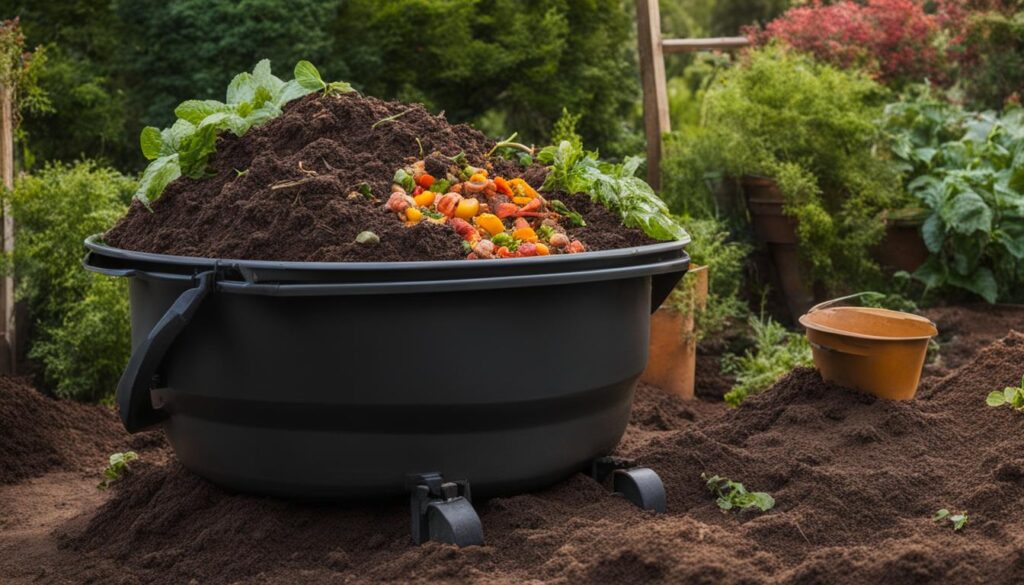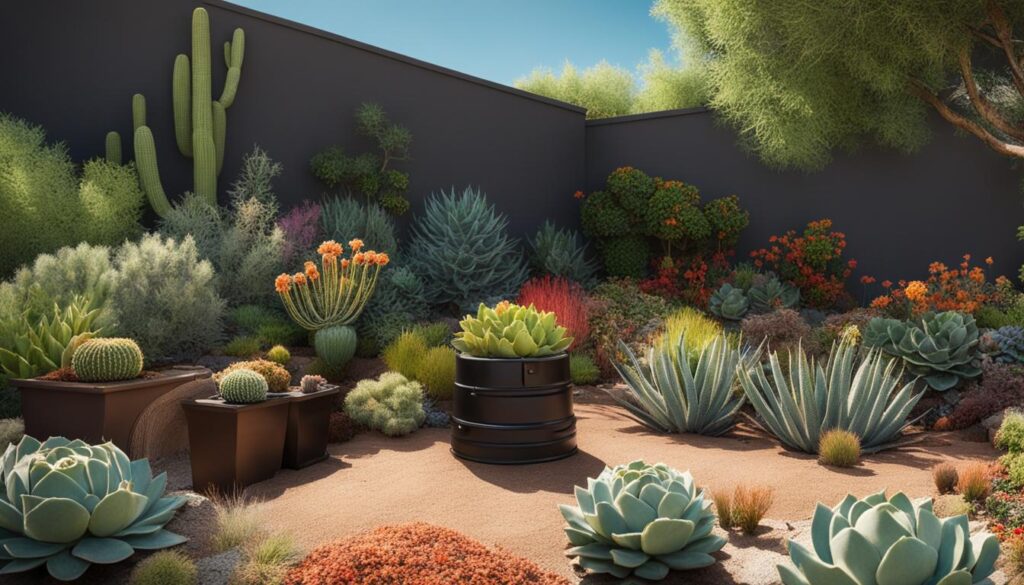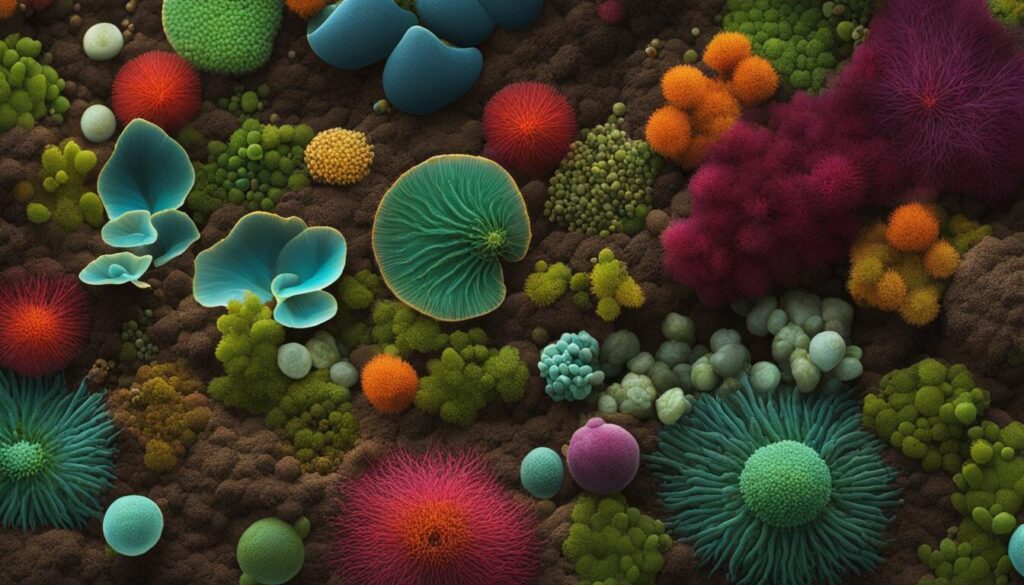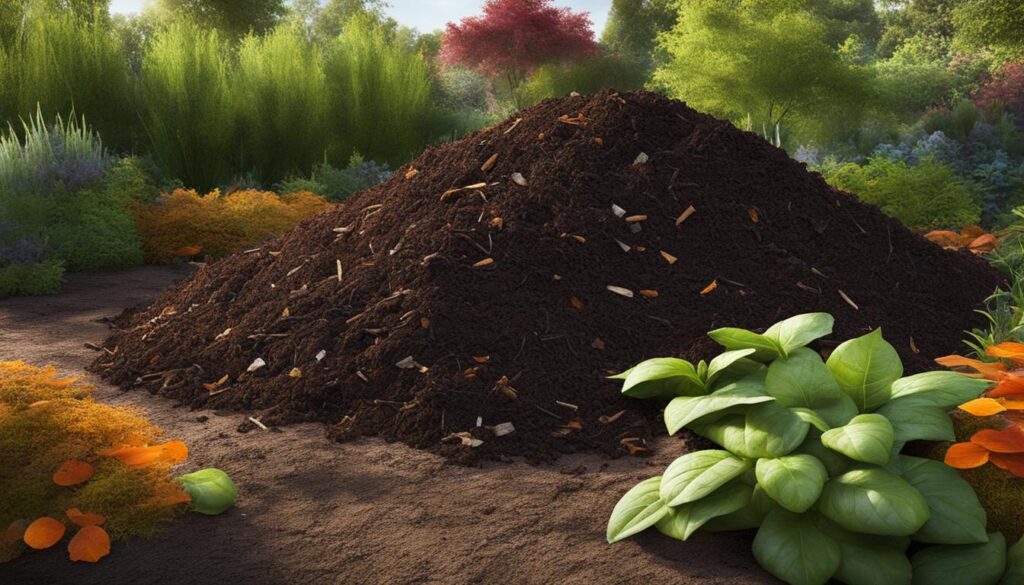Composting is a powerful technique for improving the health of soil in xeriscape gardens. By harnessing the benefits of organic compost, gardeners can enhance the fertility and sustainability of their arid landscapes. In order to unlock the full potential of composting for xeriscape garden soil health, it is important to understand the wide range of materials that can be composted.
Key Takeaways:
- Xeriscape gardens can greatly benefit from composting for soil health and sustainability.
- Composting is a versatile process that can handle a variety of organic waste materials.
- By adding organic matter through composting, gardeners can improve water retention and nutrient availability.
- Soil microbes play a crucial role in the composting process and contribute to nutrient cycling.
- Composting supports sustainable gardening practices, waste reduction, and environmental impact reduction.
What can be composted?
Composting is a versatile process that can handle a wide range of organic waste materials. By composting these materials, you can divert them from landfills and instead turn them into valuable nutrients for your xeriscape garden. Here are some common items that can be composted:
- Fruits and vegetables
- Pasta, bread, cereals, and baked goods
- Coffee grounds and filters, tea bags
- Eggshells
- Dairy products
- Brewery hops
- Tree and landscape waste
- Grass clippings
- Flowers and plants
- Yard waste
- Tree waste
- Forage waste
- Crop residue
- Straw, sawdust, and leaf litter
- Husks and vegetative waste
- Waste water
- Manure and biosolids
- Forestry waste
- Wood and woody biomass
Table: Accepted Compost Materials
| Organic Waste Materials | Examples |
|---|---|
| Fruits and vegetables | Apple cores, carrot peels, potato scraps |
| Pasta, bread, cereals, and baked goods | Pasta leftovers, bread crusts, cereal scraps |
| Coffee grounds and filters, tea bags | Used coffee grounds, coffee filters, tea bags |
| Eggshells | Crushed eggshells |
| Dairy products | Expired milk, cheese scraps |
| Brewery hops | Used brewery hops |
| Tree and landscape waste | Trimmed branches, fallen leaves |
| Grass clippings | Trimmed grass from lawn mowing |
| Flowers and plants | Flower bouquets, wilted plants |
| Yard waste | Dead leaves, twigs, small branches |
| Tree waste | Tree trimmings, fallen tree bark |
| Forage waste | Hay, straw |
| Crop residue | Stalks, husks, and straw from harvested crops |
| Straw, sawdust, and leaf litter | Clean straw, sawdust, fallen leaves |
| Husks and vegetative waste | Corn husks, vegetable peels |
| Waste water | Greywater from washing dishes or vegetables |
| Manure and biosolids | Horse manure, composted biosolids |
| Forestry waste | Wood chips, bark, pine needles |
| Wood and woody biomass | Small branches, wood scraps |
Composting a diverse range of organic waste materials is not only beneficial for the environment but also for the health and fertility of your xeriscape garden soil. By recycling food waste, yard waste, agricultural waste, and other compostable materials, you can create nutrient-rich compost that will nourish your plants and support a thriving ecosystem. So, instead of throwing these materials away, consider adding them to your compost pile and harnessing their full potential.
When composting, it’s important to remember that certain materials, such as meat, bone, and fish scraps, should not be included in your compost pile, as they can attract pests and create unpleasant odors. By sticking to compostable materials like the ones listed above, you can ensure a successful and effective composting process that will benefit your xeriscape garden.
Now that you know what can be composted, it’s time to unlock the power of composting for your xeriscape garden. By utilizing these organic waste materials, you can create nutrient-rich soil that promotes plant growth, enhances water retention, and supports a sustainable gardening practice.
Importance of Composting in Xeriscape Gardens
Xeriscape gardening relies on the principles of water conservation and sustainable practices to create beautiful and thriving landscapes in arid environments. Composting plays a crucial role in achieving these goals by enhancing soil fertility and promoting water conservation. By incorporating organic matter through composting, you can improve the water-holding capacity of your soil, reduce erosion, increase nutrient availability for plants, and support a healthy microbial ecosystem.
Composting enriches xeriscape garden soil with essential nutrients, such as nitrogen, phosphorus, and potassium, that plants need for optimal growth. It also helps to improve the structure of the soil, making it more porous and allowing for better water infiltration and retention. This is particularly beneficial in xeriscape gardens, where water is a precious resource. The added organic matter acts as a sponge, absorbing and holding water, reducing the need for frequent watering and conserving water in the process.
“Composting is an essential practice for creating resilient and sustainable xeriscape gardens.”
In addition to improving soil fertility and water conservation, composting supports a thriving microbial community in the soil. Soil microbes play a critical role in breaking down organic matter and making nutrients available to plants. By providing a rich source of organic material through composting, you can nurture these beneficial soil organisms, creating a healthy soil ecosystem that supports the growth and overall health of your xeriscape garden plants.
In summary, composting is an indispensable practice for xeriscape gardeners. It enhances soil fertility, improves water retention, and promotes a healthy soil ecosystem, all while reducing the need for synthetic fertilizers and conserving water. By incorporating composting into your xeriscape gardening routine, you can create resilient and sustainable landscapes that thrive in arid conditions.
The Microbial World Beneath Our Feet
Composting is not just a physical process; it is a complex collaboration between soil microbes and organic matter. These microscopic organisms, such as bacteria, fungi, and other microbes, play a vital role in breaking down the composting materials. They feed on the organic matter, breaking it down into simpler forms that can be used by plants.
The microbial community in compost piles is diverse, with different species performing different functions. Bacteria are the primary decomposers, breaking down the organic matter into smaller molecules. Fungi, on the other hand, specialize in breaking down complex compounds like cellulose and lignin. Other microorganisms, like actinomycetes, contribute to the decomposition process and help create a stable and nutrient-rich compost.
This microbial activity in compost piles also facilitates nutrient cycling. As the organic matter decomposes, nutrients are released and made available to plants. This nutrient-rich environment supports plant growth and enhances overall plant health. The presence of beneficial microbes in the compost also helps suppress harmful pathogens, protecting plants from diseases.
The Role of Soil Microbes in Nutrient Cycling
Soil microbes are essential for nutrient cycling in composting. They break down complex organic compounds, releasing essential elements like nitrogen, phosphorus, and potassium. These nutrients are then taken up by plants, promoting healthy growth and development.
Microbes also contribute to the formation of humus, a stable organic matter that improves soil structure and water-holding capacity. Humus acts as a sponge, holding moisture and preventing nutrient leaching. It also enhances soil aggregation, creating spaces for air and water movement, necessary for plant root growth and nutrient uptake.
The intricate dance between soil microbes and organic matter in composting creates a thriving ecosystem beneath our feet, supporting plant health and sustainable gardening practices. By harnessing the power of these microscopic organisms, we can unlock the full potential of composting and create nutrient-rich soil for our xeriscape gardens.
Composting as a Tool for Soil Restoration
Composting can be a powerful tool for soil restoration, particularly in the case of degraded soils such as those impacted by glacial till. As demonstrated by Anne Biklé and David Montgomery in their book “The Hidden Half of Nature,” compost application can significantly transform barren soil into a thriving garden. In their backyard in north Seattle, the authors experienced firsthand the positive effects of adding layers of compost to their soil, which helped mitigate the challenges posed by glacial till. The accelerated soil transformation they witnessed inspired them to delve deeper into the scientific explanations behind composting’s effectiveness.
Soil restoration through composting involves the application of nutrient-rich organic matter, which helps improve soil structure, water retention, and overall fertility. Compost acts as a natural amendment that replenishes the soil with essential nutrients and promotes the growth of beneficial microorganisms. As the compost breaks down, it releases nutrients gradually, ensuring a steady supply for plants and supporting their health and growth. Furthermore, the organic matter in compost enhances the soil’s ability to hold water, reducing the risk of erosion and improving the resilience of the ecosystem.
The Benefits of Composting for Soil Restoration
When it comes to soil restoration, composting offers several key benefits:
- Amending degraded soil: Compost provides vital nutrients and organic matter that help replenish depleted soils, revitalizing their fertility.
- Enhancing water retention: The organic matter in compost improves the soil’s water-holding capacity, reducing water runoff and promoting optimal moisture levels for plant growth.
- Supporting microbial activity: Compost fosters the growth of beneficial microorganisms, such as bacteria and fungi, that contribute to nutrient cycling and soil health.
- Improving soil structure: The addition of compost helps improve soil structure, creating a crumbly, well-aerated medium that facilitates root development and nutrient absorption.
| Benefits of Composting for Soil Restoration | |
|---|---|
| Amending degraded soil | Providing vital nutrients and organic matter to replenish depleted soils |
| Enhancing water retention | Improving the soil’s ability to hold water, reducing runoff |
| Supporting microbial activity | Fostering the growth of beneficial microorganisms for nutrient cycling |
| Improving soil structure | Creating a well-aerated medium for root development and nutrient absorption |
“Composting provides a natural solution for restoring degraded soils and promoting the recovery of ecosystems. By harnessing the power of organic matter and beneficial microorganisms, we can transform barren land into fertile ground for sustainable agriculture and thriving plant life.” – Anne Biklé and David Montgomery
In summary, composting is a valuable tool for restoring degraded soils by providing essential nutrients, improving water retention, and supporting microbial activity. The addition of compost enhances soil structure and promotes a healthy ecosystem that fosters the growth of plants and beneficial microorganisms. By incorporating composting practices into soil restoration efforts, gardeners and landowners can contribute to the regeneration of ecosystems and create sustainable environments for future generations.
The Link Between Soil and Human Health
Did you know that the health of the soil beneath our feet is closely connected to our own well-being? The soil microbiome, which consists of the diverse community of microorganisms living in the soil, plays a vital role in maintaining the balance of ecosystems. Similarly, the human microbiota, particularly the gut microbiome, has a significant impact on our digestion, immune function, and overall health.
Scientific research has unveiled the intricate link between soil health and human health, highlighting the importance of organic gardening practices and composting. By practicing organic gardening and nourishing the soil with compost, you can support a healthy soil microbiome and potentially improve your own well-being.
“The health of soil, plant, animal, and man is one and indivisible.”
— Sir Albert Howard, The Soil and Health
Organic gardening, which avoids the use of synthetic fertilizers and pesticides, nurtures the soil microbiome and promotes a diverse and thriving microbial ecosystem. This, in turn, enhances nutrient availability for plants and increases the nutritional value of the crops we consume. By consuming a variety of plant-based foods grown in healthy soil, we can support our own gut microbiome, which is essential for digestion, nutrient absorption, immune function, and disease prevention.
So, by embracing organic gardening practices and incorporating compost into your garden, you not only support the health of the soil and the environment but also contribute to your own well-being. Take the first step towards a healthier you by harnessing the power of the soil microbiome and organic gardening through composting.
Choosing the Right Compost Materials
To achieve a balanced compost that provides the necessary nutrients for xeriscape gardens, it is important to choose the right compost materials. The carbon-to-nitrogen ratio is a critical factor in composting. Sources suggest that a ratio of approximately 30 parts carbon to 1 part nitrogen is ideal. This can be achieved by combining various compostable materials such as food waste, yard waste, agricultural waste, and BPI certified compostables. Balancing the compost ingredients will result in a nutrient-rich end product.
Compost Ingredients
When selecting compost materials for your xeriscape garden, it’s important to consider a variety of organic waste sources. This allows for a diverse mix of nutrients, ensuring a balanced compost. Some common materials that can be used include:
- Fruits and vegetables
- Pasta, bread, cereals, and baked goods
- Coffee grounds and filters, tea bags
- Eggshells
- Dairy products
- Tree and landscape waste, grass clippings, flowers, plants, and yard waste
- Tree waste, forage waste, crop residue, straw, sawdust, leaf litter, and husks
- Vegetative waste, waste water, manure, and biosolids
- Forestry waste, wood, and woody biomass
By incorporating a diverse range of compost materials, you can ensure that your xeriscape garden receives a balanced mix of nutrients, promoting healthy plant growth and soil fertility.
Carbon-to-Nitrogen Ratio
The carbon-to-nitrogen ratio (C:N ratio) is a crucial consideration when creating compost. This ratio influences the decomposition rate and the availability of nutrients in the compost. A C:N ratio of approximately 30:1 is recommended for optimal composting. Too much carbon-rich material can slow down the decomposition process, while too much nitrogen-rich material can result in a smelly and slimy compost pile.
To achieve the ideal C:N ratio, it is important to balance the compost materials. Carbon-rich materials include leaves, straw, sawdust, and woody materials, while nitrogen-rich materials include kitchen scraps, grass clippings, and manure. By mixing these materials in the right proportions, you can create a balanced compost that supports the growth of healthy plants in your xeriscape garden.
| Carbon-Rich Materials | Nitrogen-Rich Materials |
|---|---|
| Leaves | Grass clippings |
| Straw | Kitchen scraps |
| Sawdust | Manure |
| Woody materials |
By following these guidelines and choosing the right compost materials with a balanced carbon-to-nitrogen ratio, you can create nutrient-rich compost that will improve the health and fertility of your xeriscape garden soil.
Composting Best Practices for Xeriscape Gardens
Composting is a valuable technique for improving soil health in xeriscape gardens. To ensure successful composting, it is important to follow some key tips and practices. By incorporating these composting best practices into your gardening routine, you can maximize the benefits of compost for your xeriscape garden’s soil health.
Soil Amendments
Incorporating compost into the soil as a soil amendment is one of the most effective ways to improve its fertility. When adding compost, ensure that it is well-mixed with the existing soil to distribute nutrients evenly. This will help enhance the soil’s structure, water-holding capacity, and nutrient levels. Aim to apply compost at a depth of 2-4 inches and work it into the top 6-8 inches of soil.
Compost Application
Applying compost on top of the soil as a mulch is another beneficial practice. A layer of compost mulch helps retain moisture in the soil, suppresses weeds, and provides a slow release of nutrients over time. Spread a 1-2 inch layer of compost mulch around your plants, making sure to leave a gap around the plant stems to prevent moisture-related issues.
Watering Techniques
Proper watering techniques are crucial for the breakdown of compost and the overall health of your xeriscape garden. Water your garden deeply and infrequently, allowing the soil to dry out slightly between waterings. This encourages the compost to decompose gradually and allows the roots to grow deeper in search of moisture. Avoid overwatering, as it can lead to nutrient leaching and root rot.
By following these composting best practices, you can enhance the soil health of your xeriscape garden and create a thriving, sustainable landscape. Remember to regularly turn your compost pile to accelerate decomposition and maintain a proper balance between carbon-rich and nitrogen-rich materials. With these tips, you’ll be on your way to achieving a healthy, nutrient-rich soil for your xeriscape garden.
The impact of composting on water-wise gardening
When it comes to water-wise gardening, composting plays a crucial role in improving water retention, enhancing soil structure, and increasing organic matter content. By adding compost to your soil, you can create a more resilient and sustainable garden that requires less watering. The addition of compost acts as a natural sponge, absorbing and holding water for longer periods, which reduces the need for frequent irrigation.
Water retention is vital in xeriscape gardens, where water scarcity is a common challenge. By incorporating compost into your soil, you can improve its ability to retain moisture, ensuring that your plants have access to water even during dry periods. This not only helps conserve water but also promotes healthier plant growth and reduces the risk of water stress-related issues.
In addition to improving water retention, composting also enhances soil structure. The organic matter in compost helps bind soil particles together, creating larger pore spaces that allow water to penetrate the soil more easily. This improved soil structure facilitates better root growth and nutrient uptake, resulting in healthier and more resilient plants.
“Composting is a game-changer for water-wise gardening. By amending your soil with compost, you can create a garden that is not only beautiful but also environmentally sustainable. The organic matter in compost acts as a reservoir, holding onto water and releasing it slowly to plant roots when needed.”
By increasing organic matter content through composting, you can enhance soil fertility and nutrient availability. Organic matter serves as a food source for beneficial soil microbes, promoting a thriving ecosystem that supports plant health. These microbes break down organic matter further, releasing essential nutrients that plants require for growth. As a result, composting contributes to the overall well-being of your garden by nourishing the soil and promoting optimal plant nutrition.
| Benefit | How composting helps |
|---|---|
| Improved water retention | The organic matter in compost acts as a sponge, holding onto water and releasing it slowly to plant roots. |
| Enhanced soil structure | Compost binds soil particles together, creating larger pore spaces that allow for better water infiltration. |
| Increased organic matter content | Composting adds organic matter to the soil, promoting the growth of beneficial soil microbes and releasing essential nutrients. |
Composting is a valuable practice for water-wise gardening, enabling you to create a garden that thrives even in water-scarce conditions. By harnessing the power of compost, you can conserve water, improve soil structure, and enhance the overall health of your garden. Embrace composting as a sustainable solution for water-wise gardening and enjoy the benefits of a beautiful and resilient landscape.
Fostering Sustainable Practices Through Composting
Composting is not just a beneficial practice for xeriscape gardens; it also plays a crucial role in fostering sustainable gardening practices. By diverting organic waste from landfills and turning it into nutrient-rich compost, gardeners contribute to waste reduction and minimize their environmental impact. The composting process facilitates nutrient cycling, reducing the need for synthetic fertilizers and promoting a more sustainable and eco-friendly approach to gardening. Embracing composting for xeriscape garden soil health is a step towards fostering a more sustainable future.
One of the key benefits of composting is its role in nutrient cycling. Through the composting process, organic waste materials break down and release essential nutrients that are then absorbed by plants. This natural recycling of nutrients not only reduces the need for chemical fertilizers but also helps maintain a healthy and productive garden. By adopting composting practices, you can create a closed-loop system where waste is transformed into valuable resources, minimizing the reliance on external inputs and creating a more sustainable gardening ecosystem.
Composting also plays a significant role in waste reduction. By diverting organic waste from landfills, gardeners can help reduce methane emissions, a potent greenhouse gas. According to the U.S. Environmental Protection Agency, organic materials, including food scraps and yard waste, make up about 30% of the waste sent to landfills. By composting these materials instead, you can contribute to reducing the environmental impact of waste disposal while creating a valuable resource for your garden.
Benefits of Composting for Sustainable Gardening
- Reduces the need for synthetic fertilizers
- Promotes nutrient cycling in the garden
- Diverts organic waste from landfills
- Reduces greenhouse gas emissions
- Improves soil health and fertility
- Enhances water retention capabilities
- Supports a closed-loop system
Composting is not only an effective way to improve soil health and promote plant growth in xeriscape gardens but also a powerful tool for creating a more sustainable future. By embracing composting practices, gardeners can contribute to waste reduction, nutrient cycling, and the overall health of our environment. With each pile of compost, you are taking a step towards a more sustainable and resilient garden ecosystem.
| Benefits of Composting for Sustainable Gardening |
|---|
| Reduces the need for synthetic fertilizers |
| Promotes nutrient cycling in the garden |
| Diverts organic waste from landfills |
| Reduces greenhouse gas emissions |
| Improves soil health and fertility |
| Enhances water retention capabilities |
| Supports a closed-loop system |
Embrace sustainable gardening practices by incorporating composting into your xeriscape garden routine. Join the movement towards waste reduction, nutrient cycling, and environmental preservation. Start composting today and be a part of a greener, more sustainable future.
How Can Composting Improve Soil Health in Xeriscape Gardens?
Composting plays a critical role in improving xeriscape gardens. By adding organic matter to the soil, xeriscaping benefits with soil microbes, which enhance the soil structure and nutrient content. This, in turn, helps the soil retain moisture more effectively, making it an ideal solution for water conservation in arid environments.
Conclusion
Composting offers a multitude of benefits for xeriscape gardens, promoting sustainability and enhancing soil health. By embracing this practice and incorporating nutrient-rich compost into your garden, you can improve fertility, water retention, and overall resilience.
Aside from its positive impact on garden health, composting also contributes to waste reduction and supports the growth of beneficial soil microbes. By diverting organic waste from landfills and turning it into compost, you can play your part in minimizing environmental impact.
Unlock the power of composting today and pave the way for a thriving xeriscape garden. Embrace this sustainable practice and experience the numerous benefits it brings to your garden’s sustainability and soil health.














